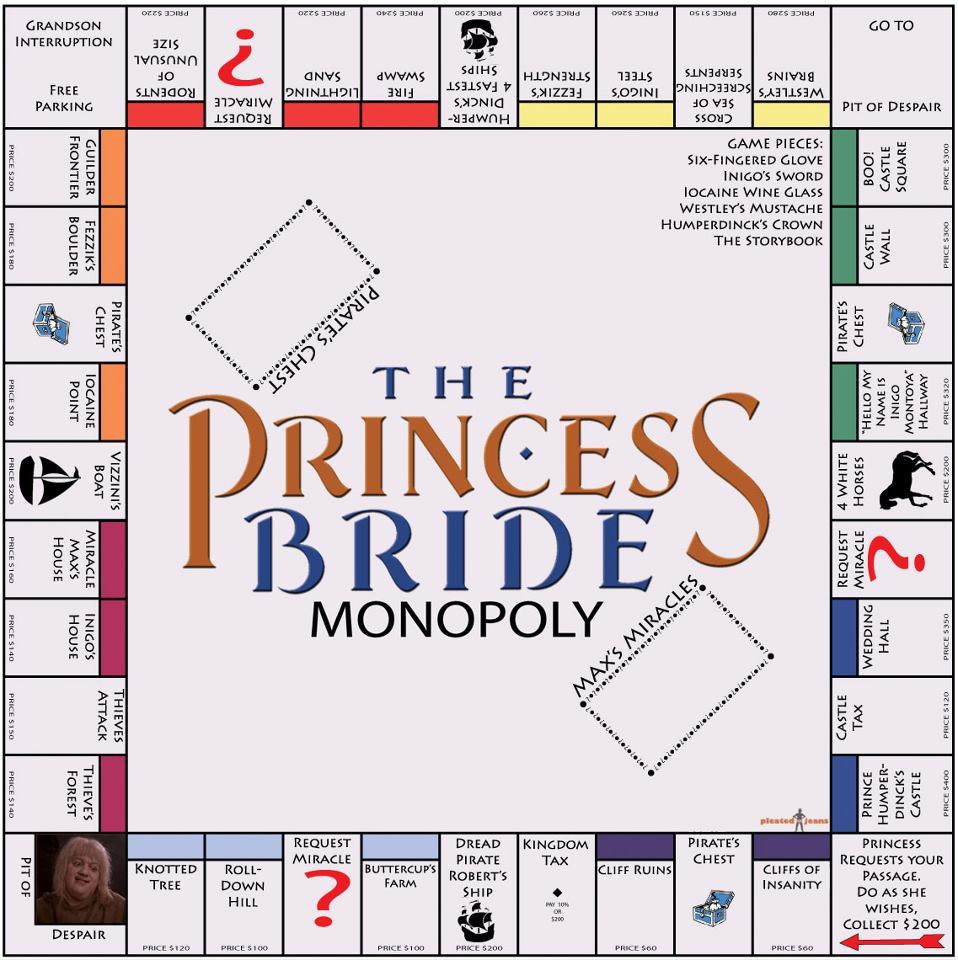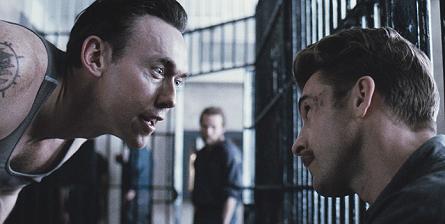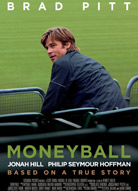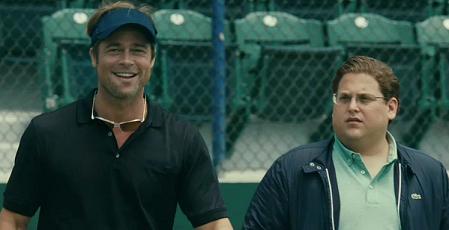Distant Relatives: Rocky and Moneyball
 Thursday, February 2, 2012 at 4:00PM
Thursday, February 2, 2012 at 4:00PM Robert here w/ Distant Relatives, exploring the connections between one classic and one contemporary film.
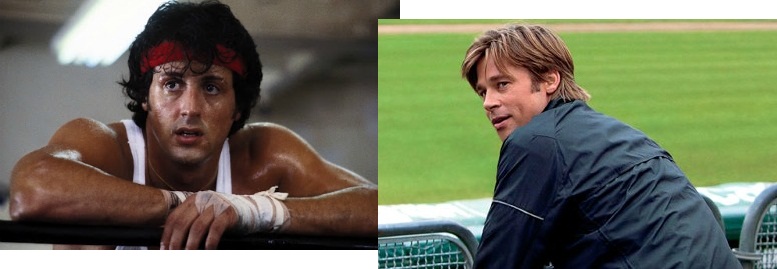
Most of the time in life we view ourselves as underdogs. Nobody really feels like an expert or a person of power. As such, the only way to succeed beyond our wildest dreams is to overcome the powerful, like Apollo Creed's pompous entourage or the well established like MLB's back rooms of smokey scouts. The two films we'll look at today enjoy utilizing the well worn tropes of the sports genre or to be more specific the redemption story sports genre and give us characters who are surrogates for us to be and for us to root for. Rocky, possibly the most famous sports movie of all time, certainly the most famous sports film to ever win Best Picture, tells us the story (as if you didn't know) of small time boxer Rocky Balboa, a normal downtrodden guy given a shot to box World Heavyweight Champion Apollo Creed in what's essentially a gimmick match when Apollo's appropriate challenger gets injured and a quick replacement is needed. In Moneyball we follow Oakland A's General Manager Billy Beane, a man with the unfortunate and nearly impossible task of assembling a small market, low budget baseball team that can compete with rich teams like the New York Yankees. With help he institues a system high on formulas and equations and low on traditional baseball intuition. Naturally, everyone expects him to fail. So our David and Goliath storylines are set up, and even with us the viewer naturally leaning toward the Davids of the world, is this enough for us to root for them?
Getting a chance at the champ of Boxing is a pretty lucky break for Rocky. And having a job in professional Baseball doesn't exactly evoke sympathy for Beane. This begs the question, how to really get us behind our protagonists. Well, these films could paint them into saintly perfection, beatify them as all-great heroes, or they could present them as multi-layered individuals, men with faults, faults that we understand, faults that we too possess. Consider Rocky Balboa. It's clear that the opportunity he has handed to him has little to do with his own cunning. The man hasn't exactly grabbed life by the horns. He's a shy, quiet guy, nervous around women, unlikely to make it much farther than he already has. As for Beane, he has somethign of a sad history in baseball. As a young man, eager scouts with big promises presented him an opportunity (and paycheck) that he couldn't refuse even though, as it turned out, he wasn't quite pro material. Was it right for Beane to dive headlong into his impending disaster? Maybe not. But would you have turned it down? Perhaps you're not like Rocky. You're not shy and shabby. But you've felt like a failure before. And maybe you're not like Billy Beane. Maybe you don't care about Baseball. But you've longed for a dream, even when you know it wasn't to be so.
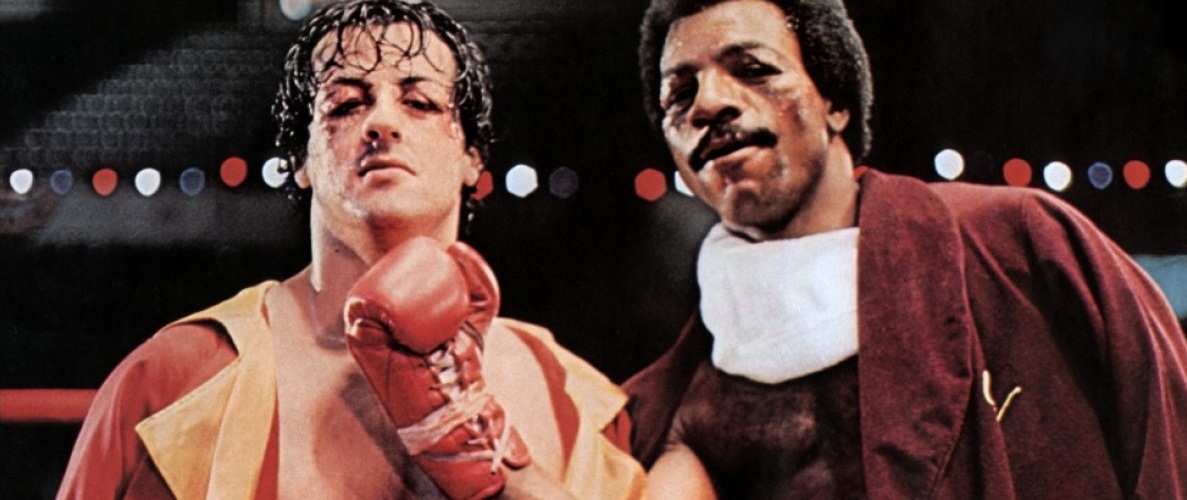
With both films presenting simlarly sympathetic heroes, we come to the equally unscalable stakes. Apollo Creed is unbeateable. Not only has no other boxer ever defeated him, no boxer has ever stayed on his feet through an entire match. For Rocky to defeat Creed would be unprecedented. As for Beane, a the baseball experts so spitefully remind him, no one has ever so untraditionally assembled a team. To do so with success would change the sport. To lose for both of these men would most likely mean their livelihoods. Balboa would become the sucker who was creamed by Creed. His boxing career, not to mention his health could be wiped out, just as he's finally finding someone special and worth providing for. Beane too is on the brink of becoming the laughing stock of a sport he's spent his entire professional life in. Even if he were lucky enough to stay in the business it would mean demotion and relocation and all at the cost of his loving daughter's constant worry. With odds like that, the terrifyingly tense scene is set for these men to succeed. And here's the thing: in both cases, they don't.
But of course they do. In typical, yet still well structured sports-film fashion, there are things bigger than winning and losing. In both the cases of Balboa and Beane, their success is measured differently than first expected. Balboa famously "goes the distance" against Creed, still losing but avoiding the KO. Similarly Beane doesn't win the World Series with his team of misfits. But he does break the all-time American League winning streak, a feat probably harder than winning the World Series, and in doing so creates a team that becomes a baseball phenomenon. In both cases this could be a ploy, a pander. Telling we, the audience, who traversed the film's long path in the sympathetic shoes of our protagonists that even when we fail against impossible odds, we can still be winners. But say what you will about the sentimentality of these movies (and you're probably saying it more about Rocky than Moneyball), I don't think it's a pander. What we have are two films that break out of easy sports categorizaion by allowing our heroes to achieve something greater than what can be measured by a simple sports storyline.
This is what makes both films such successful redemption stories. They present us with a similarly likable character, impossible task and unexpected victory on new terms. So if you find yourself pondering if all of the sidetracks into Beane's personal life were really necessary or chucking at Rocky's much parodied shouts of "Adrian! Adrian!" remember that these are the elements that make these films sink or swim. They're the personal stories that emphasize the intimate in the shadow of the impossible. They create tensino. They create excitement. They make you hold your breath.
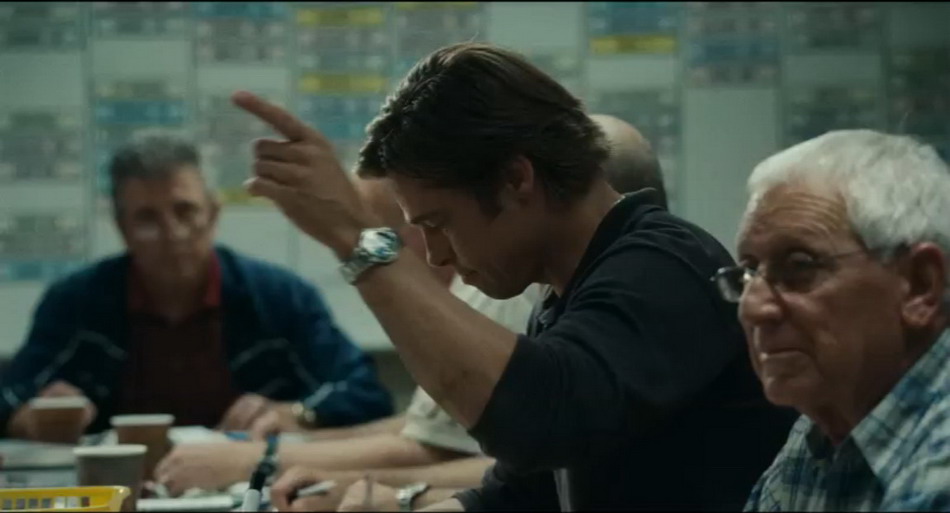
Other Cinematic Relatives: The King's Speech (2010), Cinderella Man (2005), Chariots of Fire (1981), Hoosiers (1986)
 Bennett Miller,
Bennett Miller,  Brad Pitt,
Brad Pitt,  Distant Relatives,
Distant Relatives,  Moneyball,
Moneyball,  Oscars,
Oscars,  Rocky
Rocky 



